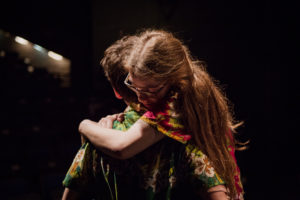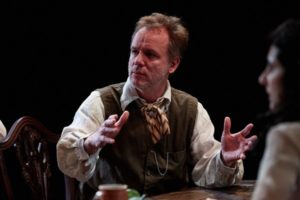
Uncle Vanya was first published in 1897 and had its premiere in Moscow in 1899, performed by the Moscow Art Theatre under the direction of Konstantin Stanislavski.
The play focuses on the visit of an elderly professor and his young wife Elena to the rural estate which supports their city dwelling lifestyle. Two friends, Vanya-the brother of the professor’s late first wife and the controller of the estate and Astrov-the local doctor, both end up falling for the charms of Elena. Sonya, the professor’s daughter by his first wife, is hopelessly in love with the doctor but her feelings are unmatched. Tempers flare and drama ensues as the professor announces his plans to sell the estate allowing Vanya to spiral into a madness offering tormented bawling and even a gunfight!
This new production written by Peter Gill and directed by Tamara Harvey of Chekhov’s doom-tinged comedy is set in the round, allowing for the feeling of immersion as an audience member, particularly during each characters’ soliloquy. We feel we are let in on the action, surrounding the players; close emotionally as well as physically. Each scene cleverly switches from outside to in and we are treated to some glorious pieces of silent acting as the characters themselves subtly manoeuvre the set to allow transitions (for example we hear claps of thunder and rainfall and a handful of actors swiftly grab chairs and rugs to ‘save them from getting wet’). The design of the piece, in this way, is very simple and yet we could look so much further into its meaning. Throughout the entire production there is an overhanging tree which could have been placed simply to remind us where we are. Could it, on the other hand, be symbolic of the overhanging, inevitable destruction in the piece?
The destruction of man and oneself is reflected in the frequent discussions of the desolation of the Earth’s forests. We cannot fail to spot the implications that humankind may not be KIND at all and that the dissatisfaction in our lives comes not only from ones own failings but from the failings of others to encourage success and happiness. We see love in all forms; love for family (as much as we may often speak ill of them or even wish then ill!), the love of nature, love of home, romantic love and even love unrequited but it appears that love brings with it sadness, frustration, sorrow and even utter despair!
Despite this, the play provides many moments of humour-mainly gleaned from the excellent characterisation of the title character by Jamie Ballard who portrays Vanya with just the right amount of comedy and tragic poise. This production has been cast superbly but special mention must also go to Rosie Sheehy as Sonya who plays the innocence and the pain of unreturned love beautifully, to Shanaya Rafaat as Elena who we are able to empathise with despite her somewhat ignorant demeanour and Oliver Dimsdale as Astrov who is both physically and mentally handsome-the stage often brought to life with each appearance.
This production of Uncle Vanya allows the stunning properties of Chekhov’s text to be fully appreciated as part of an up to date design. Despite it keeping its original 1890s setting we are able to relate the themes of the piece to our modern lives.
Tag Archives: theatr clwyd
Review, Uncle Vanya, Theatr Clwyd by Gareth Williams
 (4 / 5)
(4 / 5)
Prepare yourself for an immersive experience in the Emlyn Williams Theatre as Uncle Vanya kicks off Theatr Clwyd’s Autumn season. Having experienced the wonderful space known as the Roundabout Theatre earlier in the summer, it was a pleasant surprise to walk into something very similar here. However, whereas the Roundabout relied simply on the cast and audience imagination, the design wizards at Theatr Clwyd, led by Lucy Osbourne, have produced some spectacular scenery, enhancing the audience experience further. Walking in through the entrance, it is like Alice Through the Looking Glass. You are stepping into another world, almost literally, as you make your way across the fairly detailed set to your seat, a magnificent tree branch overarching through the roof above. It really is something to behold. The atmosphere before curtain up only added to the anticipation. There was a certain buzz around the place. Like never before have I known this place to feel so alive.

I believe that director Tamara Harvey has made a very inspired decision in performing Uncle Vanya ‘in the round’. Throughout the play, the close proximity to the audience of the actors made for an intensity of drama and emotion that would not have been so keenly felt in a proscenium. It was, in some ways, a unique experience to witness the faces of these characters so closely and to see their emotions clearly. Even now, a day later, as I am writing this, I can’t believe that my memory is able to evoke Oliver Dinsdale (Astrov) in such detailed fashion. Was he really that close to me? Yes, and what a difference that familiarity makes, not only in the moment but in the recollection too.
It truly is an evocative experience. Being ‘in the round’ helps enormously to achieve this, but it is also enhanced in a number of ways. Firstly, the costumes are of such fine and exquisite detail, perfectly suited to the period in which Vanya is set. The props only compliment this further, to the extent that it often feels like you are watching through a lens, filming, with your own eyes, a television drama. The most beautiful piece on display is the map that Astrov (Dinsdale) rolls out across the dining room table. Its colours are so striking, so meticulously drawn, the sense of realism is startling. Osbourne and her team deserve a standing ovation for their work, never mind a round of applause.
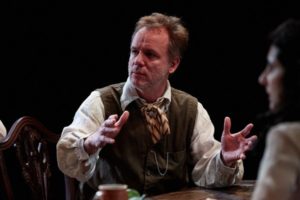
This magnificent set would be nothing though without a group of actors to bring it to life. Leading the cast is Jamie Ballard as the depressed and downtrodden, yet very humorous, Vanya. Ballard injects much regret into his character that teases itself out in playful pessimism and childish boredom. It is so easy to fall for him as a character. His well-thought out arguments, witticisms and acute personal observations make him a very likable person. Ballard reminds me very much of Tom Hollander in the way that he fully embodies his character. He is not just playing Vanya here. He is Vanya. Whereas some productions would struggle to fill the void left by such a fine performance onstage, there is no danger of that here. When Ballard is absent, it is not particularly noticeable. This is testament not only to the quality of Peter Gill’s script, but to the supporting cast as well. In particular, I would like to pick out Rosie Sheehy whose performance, as Sonja, was achingly beautiful. You could not only see the unhappiness etched on her face, it was possible to feel it too such was the intensity of her presentation. To communicate so affectingly reveals the strength of her acting skill. She was simply superb.
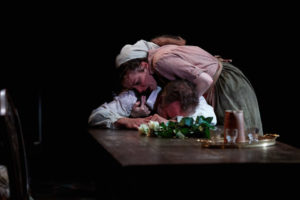
Uncle Vanya has certainly left its mark on me. It is an experience that will stay with me for a while yet, I’m sure. It shows that this production is an affecting piece of theatre, and its immersive set and talented cast only serve to make it so. Tamara Harvey has delivered on many levels, taking Anton Chekhov’s original work and producing something fresh that does not feel over a century old. She has also helped cement ‘in the round’ as my preferred style for performance theatre. Uncle Vanya is definitely worth checking out.
https://www.theatrclwyd.com/en/whats-on/uncle-vanya/
Review Celebration, Emergency Chorus, Theatr Clwyd by Bethany Maculay
L-R Ben Kulvichit and Clara Potter-Sweet in Celebration, performed at NSDF 2017 by Emergency Chorus
 (4 / 5)
(4 / 5)
The initial moments of ‘Celebration’ are an obscure, wild, and dramatically unique combination of movement, dance and silly string. Ben Kulvichit and Clara Potter-Sweet exhibit both an outstanding mutual dynamic as well as a consistent youthful vivacity that was carried expertly throughout the (unfortunately brief) fifty-five-minute performance. I was so immensely impressed by their talents (varying from acting to accordion playing), that being reminded that they were merely students made me feel, in comparison, unaccomplished. I left the theatre feeling rather smug that I had witnessed an early performance of some potentially very successful future performers.
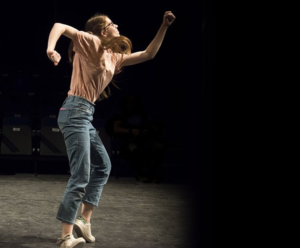
The production’s mixture of live music, electrifying dance and movement, as well as the profoundly effective drama, produced a poignant and evocative piece, that was nonetheless fun, vibrant, and an absolute pleasure to spectate. There was little pretence – most costume changes occurred on stage, and there was not a typically theatrical plot (really, it was rather Brechtian), but I felt consistently immersed in the poetic flow of each monologue and song, just as I would have done if this were a traditional piece. In fact, I am thoroughly relieved that these two young students so bravely dared to defy conventional theatre, and succeeded in delivering such an individual and positively eccentric performance. If this is where theatre is going, I’ll certainly continue to attend.
https://www.facebook.com/emergencychorus/
https://www.theatrclwyd.com/en/whats-on/celebration/
Review, Out of Love, The Roundabout Theatre at Theatr Clwyd by Gareth Williams

 (4 / 5)
(4 / 5)
Jodie Whitaker may be everyone’s new favourite female of the moment but my eye has been drawn to someone less well-known. In my second trip to the Roundabout Theatre in a week, a process of regeneration had seemingly taken place. Having taken my first steps into the pop-up theatre last week for the world premiere of Black Mountain, I had returned seven days later for another debut show. To my surprise (and delight), I found the same three actors from Brad Birch’s play starring again, this time in Out of Love by Elinor Cook. They had undergone a transformation which now saw Sally Messham and Katie Elin-Salt playing best friends Lorna and Grace. Hasan Dixon was now playing a host of male characters, showcasing his talent for versatility. However, it is Elin-Salt who has caught my undivided attention.
In Out of Love, Elin-Salt plays the lovably naïve Grace. Wearing a dungaree dress and plimsoll shoes, there is something eternally childlike about her character. Above all else, I think it is the expressive acting of Elin-Salt that conveys this with such success. She flails about on the floor, swings her legs up and down; her arms are constantly in motion, her shoulders slightly elevated; and her mouth seems to return to the default position of “slight frown” after every piece of dialogue. It is the intimate nature of this round theatre that allows the audience to pick up on such small details. This adds to the quality of the characterisation which, in Elin-Salt’s case, is near perfection.
The retention of her South Walian accent is a stroke of genius. Elin-Salt’s ability to utilise the musicality of her accent in order to convey such contrasting emotions is pure joy to the listening ear. In Black Mountain, she flattens its naturally-high pitch to express a degree of seriousness. In Out of Love, she emphasises it. This gives a comical edge to Grace that increases her likability. It also enables for the exploration of sex and sexuality. Not that this cannot be talked about in a serious way. However, Cook’s decision to examine it from the perspective of two female adolescents makes for a more naturalistic, animated and frank discussion.
There is also a vulnerability to Grace which Elin-Salt beautifully conveys – a deep desire for intimacy that hints at jealousy towards Lorna’s ability to pull men. For the supreme closeness of these two best friends, there is also a hidden tension. It is testament to the quality of Cook’s writing that this unspoken emotion never bursts onto the stage. Instead, it is veiled beneath some rather ambiguous words and actions. Through her performance, Elin-Salt manages to capture this ambiguity perfectly. She peels back the depths of Grace’s heart, ever so slightly, to subtly reveal her concealed motives. She manages to do this so imperceptibly that I could not help but burst with admiration towards the depth of her acting skills.
Out of Love is a suitably complex portrayal of female friendship. Elinor Cook presents an entertaining and engaging narrative featuring two female protagonists over some 20-30 years of their lives. Sally Messham gives an accomplished and controlled performance as Lorna. She does not put a foot wrong and perfectly complements her fellow lead. It is Katie Elin-Salt who wins much of the applause from myself however. Not excluding the above, her natural enthusiasm and depth of imagination make her an infectious talent. She weaves such fine complexity and depth of character into her performance. She is a delight to watch. She also makes a strong case for championing a great deal more female-led narratives. This is one reason to be excited at Whitaker’s casting. But whilst I await her arrival as the 13th Doctor, I shall revel in the discovery of another talented actress. Katie Elin-Salt is, surely, a major talent in waiting.
A Theatr Clwyd, Paines Plough & Orange Tree Theatre co-production | Directed by James Grieve
https://www.theatrclwyd.com/en/whats-on/out-of-love/
Review, Black Mountain, Roundabout Theatre at Theatr Clwyd by Gareth Williams
 (4 / 5)
(4 / 5)
Welcome to Roundabout. This unique pop-up theatre is taking the UK by storm. It is a masterful piece of engineering. Fully transportable, it is popping up in the most unlikely of places, including car parks, churchyards, seafronts, and housing estates. It takes six people about a day to construct, and needs nothing more than an Allen key to assemble. It is innovative, ingenious and distinctive. Its round white body is certainly noticeable alongside Theatr Clwyd, its current resting place. To have the opportunity to watch a play inside this intriguing structure was a very thrilling prospect.

The early signs were less than promising. Walking in, I could hardly see where I was going. The darkness was overwhelming. The theatre itself wasn’t much better. It was like entering a poorly-lit spaceship. I’d wandered onto the set of an early Doctor Who. I’d been transported back to the age of the 1950s B-movie. The media images seen beforehand only compounded matters further. It was a lot smaller than the press photos had made out. A technical fault at the start meant that my excitable early expectations were now almost entirely extinguished. I was really disappointed. But then the play began.
Black Mountain is a psychological thriller of the highest degree. It sees Rebecca (Katie Elin-Salt) and Paul (Hasan Dixon) travel to an isolated house in the country in an attempt to save their relationship. Writer Brad Birch has created an intriguing and unsettling plot that bubbles away with tension and drip feeds paranoia. The engrossing nature of his script meant that my initial shortcomings quickly dissipated. The intimacy of the space became its strength rather than a distractive weakness. The lighting effects used throughout were essential in the creation of a dark and disturbing tale.
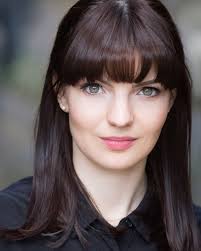

Dixon is exceptional as the stuttering Paul. He conveys a sense of deep discomfort with relative ease. You can tell his character is walking on eggshells. He has a secret to hide from his wife Rebecca. She knows something is going on, but will he admit it? Birch doesn’t make it easy. Elin-Salt brings an intensity of strength to Rebecca that makes her appear a very confident woman. It is testament to her acting skills, however, that this confident exterior also harbours an unsettling tone. There is something deeper brewing beneath the surface. She is holding on to something. But what is it? Birch draws this out across sixty compelling minutes with his absorbing dialogue.
If you enjoyed recent television dramas The Replacement and Doctor Foster, this will be another similar storyline to savour. In some ways, the live action makes for an even greater thrill ride through the tempestuous relationships on stage, particularly as Rebecca turns the screw and the appearance of Helen (Sally Messham) muddies the waters for Paul. It becomes an increasingly sinister play, utterly gripping and completely enthralling. Ultimately, I came out of the darkness having seen the light.
Black Mountain is an absorbing play. The cast are absolutely fantastic and the direction is excellent. There may be some improvements to be made on the initial entrance to the Roundabout theatre. There is nothing but positive feedback on its content here though. An impressive debut for Paines Plough in North East Wales.
To find out more about Roundabout Theatre, click here.
Review Black Mountain, Co produced by Theatre Clwyd, Paines Plough and Orange Tree Theatre by Karis Clarke

 (4 / 5)
(4 / 5)
Thursday 13th July 2017 Roundabout Pop up Theatre
Written by Brad Birch
Starring Hasan Dixon, Katie Elin-Salt and Sally Messham
Directed by awarding winning James Grieve Black Mountain is a disturbing physiological thriller that explores the darkest side of relationships. Set over a five day period, this one act play holds the audience in the middle of its white knuckle clenched palm. With a cast of three and brimming with expression the plays world premier was in the grounds of Theatre Clwyd in Paines Plough, Roundabout Popup theatre. With a limited space, a couple of props namely a torch and (another item I shall not name for fear of ruining the plot) and extremely clever and well timed lighting, the focus was solely on the acting. Thankfully the actors were all highly skilled and more than capable of delivering the multifaceted characterisations this play demanded.
I don’t want to give the plot away, as I think new stories are so few and far between in the theatre they should be cherished and discovered fresh by each audience. I will say from the get go the story had you guessing – why where they there ? What was their story ? What was really going on ? The biggest question I had constantly going on however was – who’s side was I on? This type of dilemma I have a love hate relationship with. I admire writers who can produce characters who are so much more than the words on the page – and all three of these characters clearly are. We are never given the full story – just hints as to what has happened and with one word the characters / actors spoke volumes. Speech was both passionate yet comic, weak yet strong, emotional yet pathetic – just as it is in everyday life .
The Roundabout pop up theatre is not a big space, although cleverly designed to seat a decent sized audience the actual stage space is small, fortunately for this play the close proximately to each other and the audience only added to heighten dramatic tension. I couldn’t help thinking how the play would work on a normal stage with props and staging I don’t think anything would be gained by setting the play differently, in fact I would suggest tension may be lost if the play had ran in a more naturalistic setting.
As it was, it certainly held jump out of your seat moments, if not jump out of your skin!

The Playwright Brad Birch
Well this dish had been well seasoned and cooked to a very high standard, my only reservation was the ending – without wanting to give anything away I would have been happier if there had been a final glimpse to just tie up the ending – a sprig of parsley – just for clarification – but that does go against the grain of how the play ran – there was something along the vein of The Tales of The Unexpected about the story, you thought you knew what was coming, then you never, then you did, then what you thought half an hour earlier turned out to be right all along!
Overall this was a very enjoyable piece of theatre made all the more exciting by the fact it is being performed in a portable theatre that can literally be popped up at the road side if needed. (I support anything that involves theatre getting to the people or people getting to the theatre).
Black Mountain will be showing at Theatr Clwyd, Mold until 21st July and after then it will be touring various venues including Edinburgh Fringe before concluding at the Orange Tree Theatre in March 2018.
https://www.painesplough.com/play/black-mountain
For anyone who likes their drama with a twist and sting in the tale this is a definite!
Review My Country, Theatr Clwyd by Gareth Williams
 (3 / 5)
(3 / 5)
With another General Election almost upon us, Theatr Clwyd’s staging of My Country seems particularly apt. A political play of sorts, its backdrop is last year’s divisive and historic EU referendum. In the days following the vote, the National Theatre set about touring the nation, interviewing a variety of people to hear their views on the referendum, their town, their country, their lives, and their future. The result is a smorgasbord of opinion, brought brilliantly to life on stage by Director Rufus Norris and Poet Laureate Carol Ann Duffy.
In a similar way to London Road, My Country uses a verbatim script, with Duffy weaving together some wonderfully rhythmic dialogue. She manages to capture the very conflicting and often contrasting views of people extremely well. Using the natural cadence of the English language, she has created a piece of work that is both musical in its tone and voice, and clear in its content and subject matter. It is not burdensome on the listener, with six actors representing six regions of the UK. Each actor plays between eight and twelve characters from their part of Britain. The play can get busy with these various personalities, but thankfully not so busy that one gets lost. Each is brilliantly engaging in their own way: Laura Elphinstone brings a cheeky humour to her North East; Adam Ewan a lovable snobbery to some of his South West folk; and Seema Bowri’s East Midlands characters are charmingly no-nonsense and frank. They complement one another fantastically well. As a cast, they work together brilliantly.
Keeping the six in check is Britannia, played by Penny Layden. Acting as Chairperson, she is a humble yet authoritative character. She enters the room quite ordinarily at the start, in a plain and simple blue suit. Putting down her bag, she clicks on the lights and manoeuvres the seven tables on stage. She greets the audience, then each of the six cast members in turn. They sit at their tables, and she announces the intentions of the meeting in a simple and unassuming way. Then, one by one, they lift up pictures of the people who they are representing – a diverse group that includes some recognisable faces from the political class. When it comes to then recreating their famous speeches, Layden is superb in bringing Boris Johnson, Nigel Farage and David Cameron (to name but three) to life. She not only captures their familiar accents but manages to achieve the individual nuances of their movements and gestures. It is a delight to behold.
Even as she impersonates the Westminster elite with a sense of joviality however, Layden still manages to retain Britannia’s unpretentious and sincere nature. If she were to be too satirical in her performance, the later scenes, holding much more dramatic weight, would perhaps not have worked quite as effectively. Here, there is much more emotional depth. Fractures start appearing. The six on stage start shouting and arguing with each other. Britannia seeks to keep them under control. At one stage, she appears to go through an identity crisis of her own. For a 75-minute production, it manages to say a lot in a relatively short space of time.

Ultimately, this is a play about “the sacrament of listening”. The six actors descend into more bickering and arguing as the play goes on. Britannia has to call them back each time – to “listen” again. They get so caught up in themselves that they forget to listen. We are all the same. It is the reason to feel both heartbroken and ashamed as Christian Patterson, who plays Cymru, assumes the voice of Dylan, a little boy from Merthyr Tydfil. Now and again, above the commotion, he softly speaks: “Be kind… No argues”. But nobody listens to him.
The National Theatre, under the direction of Norris, has undertaken to listen to people from across the country. Duffy has endeavoured to listen with such precision that she has used their exact words to create a multifaceted and beautifully rhythmic script. She has taken their stories and opinions seriously enough to include views from all sides – some funny, some extreme; some uplifting, others uncomfortable. They cannot be accused of being hypocritical in their content. They have listened. They call us to listen to. It is a simple yet powerful message to take away. And one, at this time in particular, that may be worth acting upon.
My Country can be seen at:
Cambridge Arts Theatre
Mon 12 – Sat 17 June 2017
https://www.cambridgeartstheatre.com/whats-on/my-country
Theatre Royal Stratford East
Mon 19 – Sat 24 June 2017
https://www.nationaltheatre.org.uk/shows/my-country-at-theatre-royal-stratford-east
https://www.theatrclwyd.com/en/whats-on/national-theatre-country-work-progress/
Collaborating with Theatr Clwyd to develop a Welsh critical network

Get the Chance has collaborated with Theatr Clwyd to run a free ‘Get the Chance to be a theatre critic’ workshop and provide free tickets to Theatr Clwyd’s production of The Importance of Being Earnest. The event was supported by Gwennan Mair Jones, Director of Creative Engagement, Theatr Clwyd.
http://www.deeside.com/theatr-clwyds-new-director-creative-engagement-will-promote-power-performing-arts-young-people-wider-community/
Get the Chance was able to run this activity through funding from Arts Council Wales Sharing Together. “A strategic initiative to encourage the development of networking opportunities.”

https://www.theatrclwyd.com/en/whats-on/get-chance-theatre-critic/
12 new critics attended the event ranging in age from 14-80 years. During the workshop we discussed the role of the critic, differing methods of giving critical feedback and the role of the press and marketing department. Many of the those attending are strong advocates for the venue and cultural provision in general. Some of the group attended youth theatre and community engagement workshops at the venue. Some of the group had an education background and had brought young people to see performances in the venue. Some of the older participants have attended performances from the theatres construction in 1976 to the present day.
The participants are all excellent examples of Creative Citizens. Get the Chance is developing a socially engaged, democratic audience development model called Creative Citizens Cymru. Many of the fundamental principles of this model are very similar to the principal goals of the Well-being of Future Generations (Wales) Act.

Some of the reviews for The Importance of Being of Earnest have been posted on the Get the Chance website
getthechance.wales/2017/05/24/review-importance-earnest-theatr-clwyd-elizabeth-lambrakis/
getthechance.wales/2017/05/21/audio-review-importance-earnest-hannah-bywood/
getthechance.wales/2017/05/21/review-importance-earnest-theatr-clwyd-bethany-mcaulay/
getthechance.wales/2017/05/21/review-importance-ernest-theatr-clwyd-karis-alaina-clarke/
It was a very welcome opportunity for Get the Chance to develop its critical network in North Wales. We thank the Arts Council of Wales for funding this opportunity and the support of colleagues at Theatr Clwyd.
All of the participants will earn Spice Time Credits for their time spent volunteering with Get the Chance Wales.
http://www.justaddspice.org/get-involved/get-started-with-time-credits
An online survey has been created to continue some of the conversations raised during the workshops we have been running. If you run a venue or company and are interested in supporting the democratisation of critical networks we invite you to contribute your thoughts to the survey. https://www.surveymonkey.co.uk/r/W27RC3Q
This is the third event Get the Chance has ran through this funding stream, blog posts of the other events can be found below
getthechance.wales/2016/11/26/launch-creative-citizens-cymru-2/
getthechance.wales/2017/01/22/get-chance-takepart/
Guy O’Donnell the director of Get the Chance organised a similar event a few years ago and a blog post on this event can be found at the link below.
http://community.nationaltheatrewales.org/profiles/blogs/critical-feedback-to-the-response-event
Review The Importance of Being Earnest, Theatr Clwyd by Elizabeth Lambrakis

 (4 / 5)
(4 / 5)
This play is an old favourite that you may well have seen before, either on stage or on screen. So that raises certain expectations – if it’s going to be a classic production then it needs to do a lot more than just tick the boxes. Richard Fitch’s production at Theatr Clwyd certainly does just that. Yes it has the lavish period sets, and yes it has the authentically recreated Victorian costumes, but it also has a whole lot more to offer.
From the moment that Algy (James Backway) bounds onto the stage the audience is bowled along by the infectious energy of this company of 8 talented actors. No opportunity for comedy is lost as Algy and his more conventional friend Jack (Matt Jessup) engage in a verbal sparring match that only escalates when the imperious Lady Bracknell arrives with wonderfully quivering feathers in her array of impressive hats (Hilary Maclean), accompanied by her deceptively dutiful daughter Gwendolen (Emma Denly). Many of the lines are so familiar that we are almost waiting for them to be delivered, but that doesn’t make them any less funny.
And then suddenly the scenery is swept away before our eyes, and we are transported from a stuffy London townhouse to a flower-filled country garden under a blue summer’s sky. The use of a soaring Strauss waltz to accompany this scene change is inspired, and the fast pace continues as we are introduced to winsome young Cecily (Robyn Cara), her eccentric governess Miss Prism (Melanie Walters) and the pompous Reverend Chasuble (Darren Lawrence). The plot thickens with the unexpected arrivals of Algy, Jack and Gwendolen in quick succession. However the highlight of Act 2 is the vitriolic exchange of pleasantries between Cecily and Gwendolen as they mistakenly believe themselves to be engaged to the same man. A special mention should also go to Nick Harris playing contrasting butlers Lane and Merryman for creating some truly hilarious comic moments.
Before we know it the two sets of young lovers are indoors again as the last Act unfolds. Soon the mystery of Jack’s foundling origins is explained when Lady Bracknell pitches up and Miss Prism’s guilty secret is finally revealed. A happy ending is on the cards for almost everyone, with not just two but three happy couples on stage, as well as Algy and Jack turning out to be long lost brothers.
This production is a joy, richly deserving a 4 star rating, and definitely a feather in the cap of upcoming director Richard Fitch and Theatr Clwyd.
Review The Importance of Being Earnest, Theatr Clwyd by Bethany Mcaulay
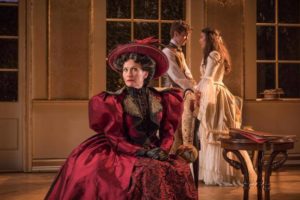
 (4 / 5)
(4 / 5)
Rife with the daring wit and perceptive observation of society, gender dynamics, and identity, that is now considered to be quintessential of Wilde’s work. A humorous, yet equally astute, and sharp revival of a play that is arguably considered overly-produced, with energising dynamism.
Firstly, there is no ambiguity regarding the place of the actors and the audience – the fourth wall is suitably maintained – yet the almost Shakespearean quality of acting and mirthful spirit of the performers seems to allow for complete immersion within every aphorism that flies from their mouths; making the experience of witnessing this production not merely an observation of a collective group of actors, but an escape into the scintillating perspective and daringly droll world of Wilde.
Physically, most of the actors embody their respective characters with seemingly easily-attainable excellence. Backway and Jessup are impressively skilful in each gesture and movement, embodying precisely the fierce quick-witted physicality and attitudes of both Algernon and John respectively. Their mutual magnetism is established from the very start, and remains equally as alluring in the final scene.
Emma Denly plays Gwendolen with tremendous charm, and is consistently, and humorously, impassioned – making it very much impossible not to feel deeply enamoured of her immaculate characterisation. However, Robyn Cara’s portrayal of Cecily pales in comparison and, though certainly of an adequate standard, does not seem to fulfil the vibrant potential of the character.
Maclean’s interpretation of the ominous matriarch, Lady Bracknell, is formidably sinister – presented with such careful control and flawless superciliousness. Each syllable is pronounced with sharp diction; each movement is consumed by an almost satirical conceit. Though, nevertheless, her subtly, and occasional shines of humour are profoundly effective.
Atmospherically, the set, sound, and lighting are ingeniously suited to the performance, enhancing the environment with an aristocratic elegance and beauty, with subdued and comforting tones that allow not only for the actor to remain the primary focus of the performance, but to have their performances enhanced by the compelling replication of the grandeur of aristocratic Victorian England.
Ultimately, Richard Fitch’s production of ‘The Importance of Being Earnest’ frankly fulfils, if not supersedes, his already established acclaim through his directorial involvement in ‘Funny Girl’, ‘Urinetown’ and ‘Buried Child’, with an almost immaculate cast, and indisputable vigour from the moment the curtain rises, to the second it falls.
https://www.theatrclwyd.com/en/whats-on/the-importance-of-being-earnest/

